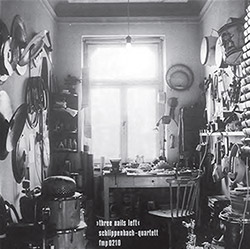
Remastered and with the original cover, the expanded Schlippenbach Trio of pianist Alexander Von Schlippenbach, saxophonist Evan Parker on soprano & tenor, drummer/percussionist Paul Lovens, and German double bassist Peter Kowald, a stellar group captured in two incredibly inventive concerts at Third New Jazz Festival Moers and at Quartier Latin in 1974 & 1975.
In Stock
Quantity in Basket: None
Log In to use our Wish List
Shipping Weight: 4.00 units
EU & UK Customers:
Discogs.com can handle your VAT payments
So please order through Discogs
Sample The Album:
Evan Parker-soprano saxophone, tenor saxophone
Alexander von Schlippenbach-piano
Peter Kowald-double bass
Paul Lovens-percussion
Click an artist name above to see in-stock items for that artist.
Label: Corbett vs. Dempsey
Catalog ID: CvsDCD072
Squidco Product Code: 29474
Format: CD
Condition: New
Released: 2020
Country: USA
Packaging: Cardboard Gatefold
Track 1 recorded live on June 2, 1974, at the Third New Jazz Festival Moers, by Michael Krause.
Tracks 2Š3 recorded live on February 2nd, 1975, at the Quartier Latin, in Berlin, Germany. by Jost Gebers.
"One of the all-time great records of improvised music from Europe. Period. Blisteringly hot. Uncompromisingly inventive. Staggeringly beautiful. And insanely rare. Originally issued in the mid '70s on FMP, at its core Three Nails Left features the legendary Schlippenbach Trio - British saxophonist Evan Parker, and German percussionist Paul Lovens joining the German pianist - the triangle squared by the addition of German bassist Peter Kowald.
Just the first track, an incredible 20-plus minute burner called "Range," is worth the price of admission - as punk rock as free music gets, it shows Parker's spectacular capabilities at high-octane blowing. Kowald adds a chewy, molasses bottom to the group, offsetting Lovens' flinty metal, stick and skin and Schlippenbach's hyper-focused intensity.
This flammable configuration performed and recorded together as a regular unit in the period, making another FMP LP, The Hidden Peak, and a recording later released on CD by Atavistic's Unheard Music Series. One side was reissued on a limited edition FMP box set, together with part of The Hidden Peak, but it's never been available intact on CD. Remastered from original tapes, packaged with the original cover design by Lovens, Three Nails Left is a stone cold classic of creative music."-Corbett Vs. Dempsey
Artist Biographies
• Show Bio for Evan Parker "Evan Parker was born in Bristol in 1944 and began to play the saxophone at the age of 14. Initially he played alto and was an admirer of Paul Desmond; by 1960 he had switched to tenor and soprano, following the example of John Coltrane, a major influence who, he would later say, determined "my choice of everything". In 1962 he went to Birmingham University to study botany but a trip to New York, where he heard the Cecil Taylor trio (with Jimmy Lyons and Sunny Murray), prompted a change of mind. What he heard was "music of a strength and intensity to mark me for life ... l came back with my academic ambitions in tatters and a desperate dream of a life playing that kind of music - 'free jazz' they called it then." Parker stayed in Birmingham for a time, often playing with pianist Howard Riley. In 1966 he moved to London, became a frequent visitor to the Little Theatre Club, centre of the city's emerging free jazz scene, and was soon invited by drummer John Stevens to join the innovative Spontaneous Music Ensemble which was experimenting with new kinds of group improvisation. Parker's first issued recording was SME's 1968 Karyobin, with a line-up of Parker, Stevens, Derek Bailey, Dave Holland and Kenny Wheeler. Parker remained in SME through various fluctuating line-ups - at one point it comprised a duo of Stevens and himself - but the late 1960s also saw him involved in a number of other fruitful associations. He began a long-standing partnership with guitarist Bailey, with whom he formed the Music Improvisation Company and, in 1970, co-founded Incus Records. (Tony Oxley, in whose sextet Parker was then playing, was a third co-founder; Parker left Incus in the mid-1980s.) Another important connection was with the bassist Peter Kowald who introduced Parker to the German free jazz scene. This led to him playing on Peter Brötzmann's 1968 Machine Gun, Manfred Schoof's 1969 European Echoes and, in 1970, joining pianist Alex von Schlippenbach and percussionist Paul Lovens in the former's trio, of which he is still a member: their recordings include Pakistani Pomade, Three Nails Left, Detto Fra Di Noi, Elf Bagatellen and Physics. Parker pursued other European links, too, playing in the Pierre Favre Quartet (with Kowald and Swiss pianist Irene Schweizer) and in the Dutch Instant Composers Pool of Misha Mengelberg and Han Bennink. The different approaches to free jazz he encountered proved both a challenging and a rewarding experience. He later recalled that the German musicians favoured a "robust, energy-based thing, not to do with delicacy or detailed listening but to do with a kind of spirit-raising, a shamanistic intensity. And l had to find a way of surviving in the heat of that atmosphere ... But after a while those contexts became more interchangeable and more people were involved in the interactions, so all kinds of hybrid musics came out, all kinds of combinations of styles." A vital catalyst for these interactions were the large ensembles in which Parker participated in the 1970s: Schlippenbach's Globe Unity Orchestra, Chris McGregor's Brotherhood of Breath, Barry Guy's London Jazz Composers Orchestra (LJCO) and occasional big bands led by Kenny Wheeler. In the late 70s Parker also worked for a time in Wheeler's small group, recording Around Six and, in 1980, he formed his own trio with Guy and LJCO percussionist Paul Lytton (with whom he had already been working in a duo for nearly a decade). This group, together with the Schlippenbach trio, remains one of Parker's top musical priorities: their recordings include Tracks, Atlanta, Imaginary Values, Breaths and Heartbeats, The Redwood Sessions and At the Vortex. In 1980, Parker directed an Improvisers Symposium in Pisa and, in 1981, he organised a special project at London's Actual Festival. By the end of the 1980s he had played in most European countries and had made various tours to the USA, Canada, Australia, New Zealand and Japan. ln 1990, following the death of Chris McGregor, he was instrumental in organising various tributes to the pianist and his fellow Blue Notes; these included two discs by the Dedication Orchestra, Spirits Rejoice and lxesa. Though he has worked extensively in both large and small ensembles, Parker is perhaps best known for his solo soprano saxophone music, a singular body of work that in recent years has centred around his continuing exploration of techniques such as circular breathing, split tonguing, overblowing, multiphonics and cross-pattern fingering. These are technical devices, yet Parker's use of them is, he says, less analytical than intuitive; he has likened performing his solo work to entering a kind of trance-state. The resulting music is certainly hypnotic, an uninterrupted flow of snaky, densely-textured sound that Parker has described as "the illusion of polyphony". Many listeners have indeed found it hard to credit that one man can create such intricate, complex music in real time. Parker's first solo recordings, made in 1974, were reissued on the Saxophone Solos CD in 1995; more recent examples are Conic Sections and Process and Reality, on the latter of which he does, for the first time, experiment with multi-tracking. Heard alone on stage, few would disagree with writer Steve Lake that "There is, still, nothing else in music - jazz or otherwise - that remotely resembles an Evan Parker solo concert." While free improvisation has been Parker's main area of activity over the last three decades, he has also found time for other musical pursuits: he has played in 'popular' contexts with Annette Peacock, Scott Walker and the Charlie Watts big band; he has performed notated pieces by Gavin Bryars, Michael Nyman and Frederic Rzewski; he has written knowledgeably about various ethnic musics in Resonance magazine. A relatively new field of interest for Parker is improvising with live electronics, a dialogue he first documented on the 1990 Hall of Mirrors CD with Walter Prati. Later experiments with electronics in the context of larger ensembles have included the Synergetics - Phonomanie III project at Ullrichsberg in 1993 and concerts by the new EP2 (Evan Parker Electronic Project) in Berlin, Nancy and at the 1995 Stockholm Electronic Music Festival where Parker's regular trio improvised with real-time electronics processed by Prati, Marco Vecchi and Phillip Wachsmann. "Each of the acoustic instrumentalists has an electronic 'shadow' who tracks him and feeds a modified version of his output back to the real-time flow of the music." The late 80s and 90s brought Parker the chance to play with some of his early heroes. He worked with Cecil Taylor in small and large groups, played with Coltrane percussionist Rashied Ali, recorded with Paul Bley: he also played a solo set as support to Ornette Coleman when Skies of America received its UK premiere in 1988. The same period found Parker renewing his acquaintance with American colleagues such as Anthony Braxton, Steve Lacy and George Lewis, with all of whom he had played in the 1970s (often in the context of London's Company festivals). His 1993 duo concert with Braxton moved John Fordham in The Guardian to raptures over "saxophone improvisation of an intensity, virtuosity, drama and balance to tax the memory for comparison". Parker's 50th birthday in 1994 brought celebratory concerts in several cities, including London, New York and Chicago. The London performance, featuring the Parker and Schlippenbach trios, was issued on a highly-acclaimed two-CD set, while participants at the American concerts included various old friends as well as more recent collaborators in Borah Bergman and Joe Lovano. The NYC radio station WKCR marked the occasion by playing five days of Parker recordings. 1994 also saw the publication of the Evan Parker Discography, compiled by ltalian writer Francesco Martinelli, plus chapters on Parker in books on contemporary musics by John Corbett and Graham Lock. Parker's future plans involve exploring further possibilities in electronics and the development of his solo music. They also depend to a large degree on continuity of the trios, of the large ensembles, of his more occasional yet still long-standing associations with that pool of musicians to whose work he remains attracted. This attraction, he explained to Coda's Laurence Svirchev, is attributable to "the personal quality of an individual voice". The players to whom he is drawn "have a language which is coherent, that is, you know who the participants are. At the same time, their language is flexible enough that they can make sense of playing with each other ... l like people who can do that, who have an intensity of purpose." " ^ Hide Bio for Evan Parker • Show Bio for Alexander von Schlippenbach "One of Europe's premier free jazz bandleaders, pianist Alexander von Schlippenbach's music mixes free and contemporary classical elements, with his slashing solos often the link between the two in his compositions. Schlippenbach formed The Globe Unity Orchestra in 1966 to perform the piece"Globe Unity, which had been commissioned by the Berliner Jazztage. He remained involved with the orchestra into the '80s. Schlippenbach began taking lessons at eight, and studied at the Staatliche Hochschule for Musik in Cologne with composers Bernd Alois Zimmermann and Rudolf Petzold. He played with Gunther Hampel in 1963, and was in Manfred Schoof's quintet from 1964 to 1967.Schlippenbach began heading various bands after 1967, among them 1970 trio with Evan Parker and Paul Lovens and a duo with Sven-Ake Johansson which they co-formed in 1976. Schlippenbach has also given many solos performances. In the late '80s, he formed the Berlin Contemporary Jazz Orchestra,which has featured a number ofesteemed European avant-garde jazz musicians including Evan Parker, Paul Lovens, KennyWheeler, Misha Mengelberg and Aki Takase. During the 90`s Duo work with Tony Oxley, Sam Rivers and Aki Takase. 1999 started performance and radiorecording of Thelonius Monks complete works, (all the compositions) with Rudi Mahall and his group "Die Enttäuschung"." ^ Hide Bio for Alexander von Schlippenbach • Show Bio for Peter Kowald "Born 1944 in Germany, died 21 September 2002 New York City; double bass, voice, tuba. Peter Brötzmann (Corbett, 1994) recounted that 'there was this young guy trying to play the bass, who was Mr Kowald, at that time seventeen years old. Peter lived with his parents. I had my little studio, so he was always hanging out at my place. But he had to be at home at 10.00, he was drinking milk. But we changed that, very soon. His parents were always very angry with me, because he never showed up at home anymore, he dropped studies of ancient languages, Greek and all that.' By this time (1962) Peter Kowald had been playing bass for two years and, with different drummers the two Peters were playing Mingus, Ornette, and Miles Davis things as well as listening to Coltrane, Stockhausen, Cage et al. Kowald was part of the European tour undertaken by the Carla Bley/Michael Mantler band in 1966 (also featuring Brötzmann) and then came work with other German musicians, membership of the Globe Unity Orchestra and the first recordings: Globe Unity, For Adolphe Sax and Summer 1967, recorded during a brief vacation in London. In particular, Evan Parker credits this visit to London for his invitation to play in the Pierre Favre/Irene Schweizer quartet and his subsequent longstanding involvement with German (and other European) musicians. Kowald's work with Brötzmann continued - on and off - on record at least, to the time of Kowald's death and included the Cooperative Trio with Andrew Cyrille, a duo on the Duos project and a recent mix of free jazz, hip-hop and rap. Peter Kowald was a member of Globe Unity Orchestra for 12 years (1966 to 1978) and for much of this time played less of a side-man role and more of an equal partner - for example, conducting the band - with the person to whom the group has become most associated, Alex von Schlippenbach. His influence is particularly noticeable on Jahrmarkt/Local fair where the two sides of composition are by Kowald (as is the second side of Live in Wuppertal and he is also credited, along with Paul Lovens as 'producing' the record, presumably sorting out the sprawling theatricality and poor sound into two 'meaningful' fragments. In his notes to 20th anniversary, Schlippenbach emphasises the importance of Kowald in creating a programme that became a lot more 'colourful'; while further pointing out that he and Kowald gradually drifted further apart 'until one fine evening after lengthy discussions which resulted in a fight in a pub in Wuppertal, this chapter also closed'. However, before this ending, from 1973 to 1978, Kowald also worked with the Schlippenbach trio (Schlippenbach/ Parker/Paul Lovens), turning it for much of this time into a regular quartet. Throughout his career, Peter Kowald worked with a wide variety of improvising musicians worldwide and in many considered and unusual situations. He recorded bass duets with Barry Guy, Barre Phillips, Peter Jacquemyn, Maarten Altena, Damon Smith and William Parker, released two solo bass recordings, and had regular groups with Leo Smith and Günter Sommer; with Joëlle Léandre and dancer Anne Martin (Trio Tartini); with dancers Cheryl Banks and Arnette de Mille and cellist Muneer Abdul Fataah (Music and Movement Improvisation); a trio with pianist Curtis Clark; a trio with Canadian alto saxophonist Yves Charuest and Louis Moholo; and Principle Life with Jeanne Lee, Klaus Hovman, and Marilyn Mazur. During the period 1980 to 1985 he was a member of the London Jazz Composers' Orchestra. He has spent periods in the US and in Japan and recorded three duo LPs (two CDs) with US, European and Japanese musicians. He also lived in Greece and similarly played and recorded with the Greek musicians Floros Floridis and Ilias Papadopoulos. By contrast, the 12 months May 1994 to May 1995 was designated Kowald's 'Year at home' project which comprised a mixture of solo works - out of which, to some extent, the last solo CD grew (Was da ist) - and group performances. In addition, Peter Kowald collaborated extensively with poets and artists and with the dancers Gerlinde Lambeck, Anne Martin, Tadashi Endo, Patsy Parker, Maria Mitchell, Sally Silvers, Cherly Banks, Arnette de Mille, Sayonara Pereira, and Kazuo Ohno. Specific works included Die klage der kaiserin (1989) with Pina Bausch, Short pieces (since 1989) with Jean Sasportes, The spirit of adventure (1990) with Anastasia Lyra, Wasser in der hand (1990/91) with Christine Brunel, and Futan no sentaku/The burden of choice (1990/91) with Min Tanaka and Butch Morris." ^ Hide Bio for Peter Kowald • Show Bio for Paul Lovens "Born in Aachen, Germany, 6 June 1949; Drums, percussion, musical saw, etc. Paul Lovens played the drums as a child. Self-taught, from the age of 14 he played in groups of various jazz styles and popular musics and from 1969 has worked almost exclusively as an improvisor on individually selected instruments. He has worked internationally with most of the leading musicians in free jazz and free improvisation, among whom have included the Globe Unity Orchestra, the Berlin Contemporary Jazz Orchestra, the Schlippenbach trio, Quintet Moderne, Company, and a duo with Paul Lytton. He has undertaken concert tours in more than 40 countries, is a founder member of a musician's cooperative and has produced recordings for his own label, Po Torch Records since 1976. He has worked with painter Herbert Bardenheuer. Despite very rare solo performances, and although giving occasional concerts with ad-hoc groups and an involvement in projects with film, dance and actors, Paul Lovens' main interest and work is musical improvisation in fixed small groups. In the mid-1990s these small groups numbered around 16, of which a few were part of a special selection, called 'vermögen'. Paul Lovens somehow epitomises the free drummer/percussionist who is not there to lay down the beat and kick everyone else into action but to listen, colour, contribute, guide, and occasionally direct, the overall cooperative sound. In concert one cannot fail to be moved by his intensity and concentration and there is an overiding feeling that even the most random events are somehow planned in time. In this respect, there is a nice irony that on the Nothing to read CD with Mats Gustafsson, Lovens describes his kit as consisting of 'selected and unselected drums and cymbals'. Miking seems to be a problem at times with some recordings giving him undue prominence and others insufficient. Good recordings are Elf bagatellen, Nothing to read, Pakistani pomade, and ,stranger than love." ^ Hide Bio for Paul Lovens
1/22/2026
Have a better biography or biography source? Please Contact Us so that we can update this biography.
1/22/2026
Have a better biography or biography source? Please Contact Us so that we can update this biography.
1/22/2026
Have a better biography or biography source? Please Contact Us so that we can update this biography.
1/22/2026
Have a better biography or biography source? Please Contact Us so that we can update this biography.
Track Listing:
1. Range 23:44
2. Black Holes 11:57
3. Three Nails Left ; For P.L. 4:11
Improvised Music
Jazz
Free Improvisation
European Improvisation, Composition and Experimental Forms
Quartet Recordings
Schlippenbach
Parker, Evan
Jazz Reissues
Staff Picks & Recommended Items
Search for other titles on the label:
Corbett vs. Dempsey.


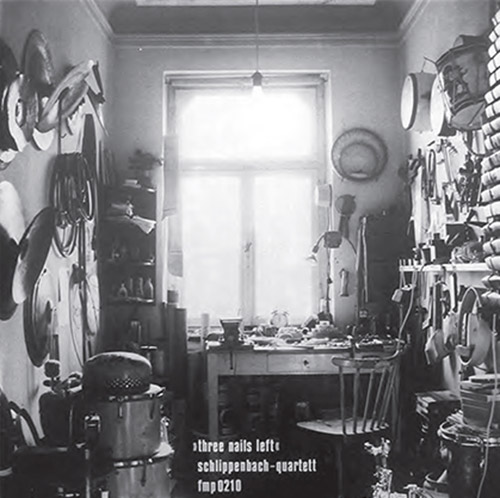








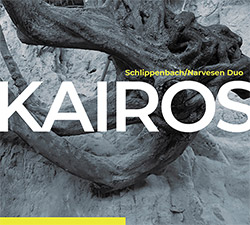


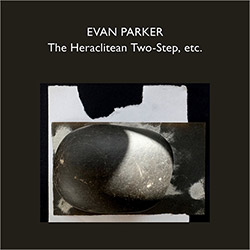



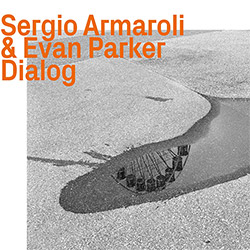





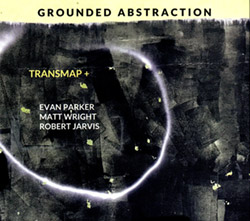
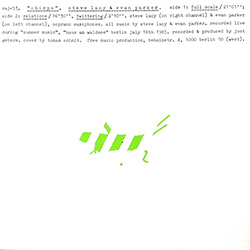







![Davies, Angharad / Burkhard Beins : Meshes Of The Evening [VINYL]](https://www.teuthida.com/productImages/misc4/36990.jpg)
![Bussmann, Nicholas / Sven-Ake Johansson / Yan Jun: Tea Time [Vinyl]](https://www.teuthida.com/productImages/misc4/36991.jpg)
![Feldman, Morton / GBSR Duo w/ Taylor MacLennan: Trios [6 CD BOX SET]](https://www.teuthida.com/productImages/misc4/37020.jpg)
![Williams, Jessica: Blue Abstraction: Prepared Piano Project 1985-1987 [VINYL]](https://www.teuthida.com/productImages/misc4/37080.jpg)
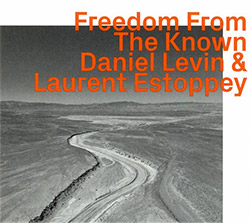
![Fagaschinski, Kai: Aerodynamics [VINYL 2 LPs]](https://www.teuthida.com/productImages/misc4/36992.jpg)
![Allbee, Liz: Breath Vessels [VINYL]](https://www.teuthida.com/productImages/misc4/37012.jpg)
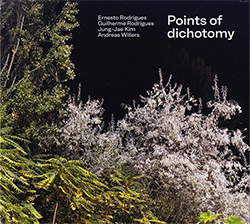
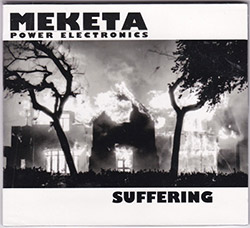


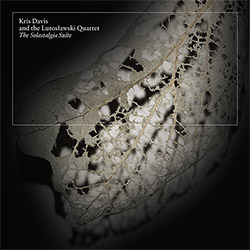
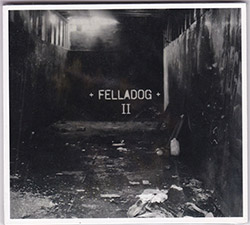


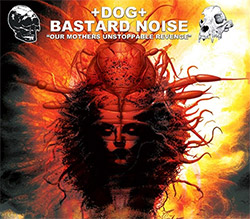



![Curran, Alvin / Andrea Centazzo / Evan Parker: Real Time Two [VINYL]](https://www.teuthida.com/productImages/misc4/37066.jpg)

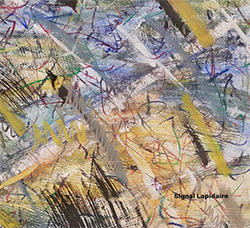

![Rodrigues, Ernesto / Jung-Jae Kim / Guilherme Rodrigues / Eric Bauer / Stephen Flinn: 5 In The Afternoon [2CDs]](https://www.teuthida.com/productImages/misc4/36957.jpg)


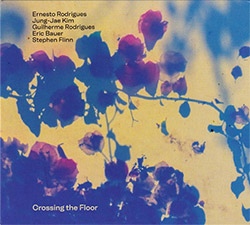





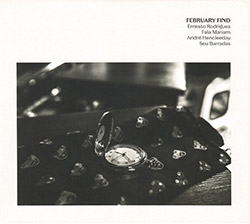
![Evans, Peter / Being & Becoming: Ars Ludricra [VINYL + DOWNLOAD]](https://www.teuthida.com/productImages/misc4/37026.jpg)

![Coley, Byron / Mats Gustafsson / Thurston Moore: Now Jazz Now: 100 Essential Free Jazz & Improvisation Recordings (1960-80) [BOOK]](https://www.teuthida.com/productImages/misc4/36932.jpg)

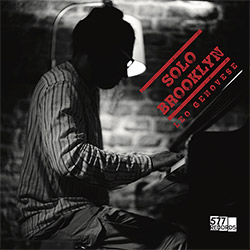
![HobbyHouse (Mia Dyberg / Axel Filip): HobbyHouse [CD + DOWNLOAD]](https://www.teuthida.com/productImages/misc4/36944.jpg)
![Mines, Kelsey / Erin Rogers: Scratching At The Surface [CD + DOWNLOAD]](https://www.teuthida.com/productImages/misc4/36945.jpg)
![Nebbia, Camila (feat/ Marilyn Crispell / Lesley Mok): A Reflection Distorts Over Water [CD + DOWNLOAD]](https://www.teuthida.com/productImages/misc4/36946.jpg)
![Vanheerentals, Adia: Taking Place [CD + DOWNLOAD]](https://www.teuthida.com/productImages/misc4/36947.jpg)

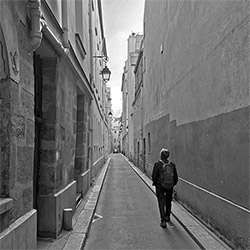
![Belorukov, Ilia / Alex Riva: Wrestling For Futility [CASSETTE w/DOWNLOAD]](https://www.teuthida.com/productImages/misc4/36994.jpg)


![Genthon, Anouck / Lionel Marchetti: Suite Blanche [2 CDs]](https://www.teuthida.com/productImages/misc4/36642.jpg)
![Toeplitz, Kasper T.: Erosions Programmees [CD + BOOKLET]](https://www.teuthida.com/productImages/misc4/36639.jpg)
![Gate, The : Almost Live [CASSETTE + MAGAZINE]](https://www.teuthida.com/productImages/misc4/36836.jpg)






![A Magic Whistle: The Solar Cell [VINYL]](https://www.teuthida.com/productImages/misc4/36658.jpg)

![McGee, Hal: Columbus Expedition [Cassette w/ Download]](https://www.teuthida.com/productImages/misc4/36650.jpg)


![Jaeger, Kassel: Fernweh [VINYL 2 LPs]](https://www.teuthida.com/productImages/misc4/36541.jpg)





![Frey, Jurg : Composer, Alone [3 CDs]](https://www.teuthida.com/productImages/misc4/36927.jpg)








![Frey, Jurg with ensemble]h[iatus: Je Laisse A La Nuit Son Poids D](https://www.teuthida.com/productImages/misc4/36988.jpg)




![Pisaro-Liu, Michael: Within (2) / Appearance (2) [2 CDs]](https://www.teuthida.com/productImages/misc4/36831.jpg)










![Musicworks Magazine: #151 Summer 25 [MAGAZINE + CD]](https://www.teuthida.com/productImages/misc4/36559.jpg)

![Brown, Dan / Dan Reynolds: Live At The Grange Hall [unauthorized][CASSETTE]](https://www.teuthida.com/productImages/misc4/36245.jpg)

![Zorn, John: The Song of Songs [CD + CD BOOK]](https://www.teuthida.com/productImages/misc4/36923.jpg)

![Coultrain: Mundus [COLORED VINYL]](https://www.teuthida.com/productImages/misc4/33056.jpg)
![Hprizm: Signs Remixed [COLORED VINYL]](https://www.teuthida.com/productImages/misc4/30635.jpg)
![Halls Of the Machine: All Tribal Dignitaries [CASSETTE w/ DOWNLOAD]](https://www.teuthida.com/productImages/misc4/36134.jpg)



![Koenjihyakkei: Live at Club Goodman [2 CDs]](https://www.teuthida.com/productImages/misc4/36111.jpg)

![Sorry For Laughing (G. Whitlow / M. Bates / Dave-Id / E. Ka-Spel): Rain Flowers [2 CDS]](https://www.teuthida.com/productImages/misc4/35985.jpg)

![Rolando, Tommaso / Andy Moor : Biscotti [CASSETTE w/ DOWNLOADS]](https://www.teuthida.com/productImages/misc4/36106.jpg)


![Electric Bird Noise / Derek Roddy: 8-10-22 [CD EP]](https://www.teuthida.com/productImages/misc4/35970.jpg)








![Elephant9 : Mythical River [VINYL]](https://www.teuthida.com/productImages/misc4/34624.jpg)



![Elephant9 with Terje Rypdal: Catching Fire [VINYL 2 LPs]](https://www.teuthida.com/productImages/misc4/35355.jpg)
![Coley, Byron: Dating Tips for Touring Bands [VINYL]](https://www.teuthida.com/productImages/misc4/17906.jpg)

![Lost Kisses: My Life is Sad & Funny [DVD]](https://www.teuthida.com/productImages/misc4/lostKissesDVD.jpg)